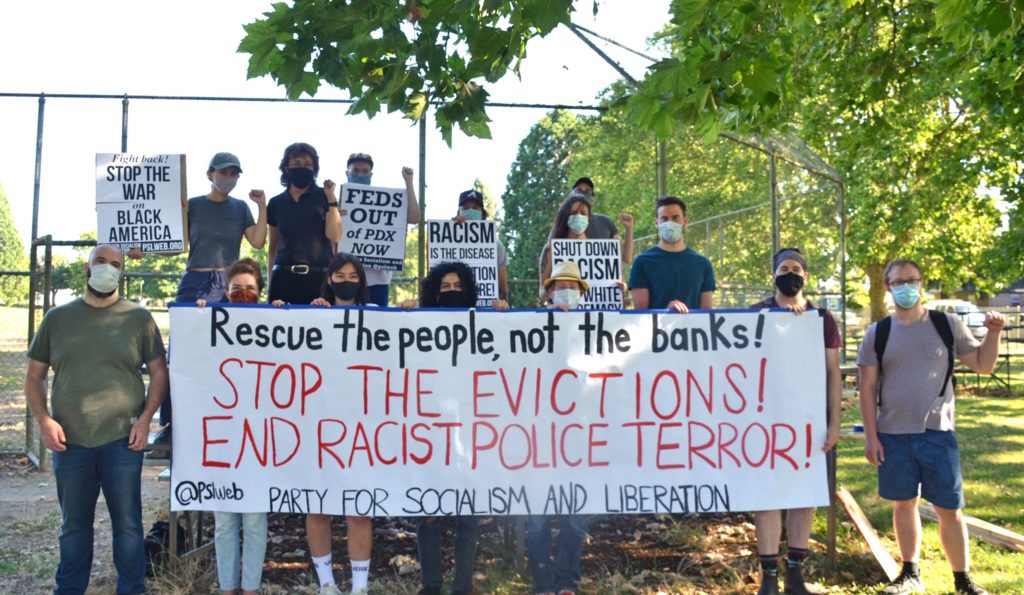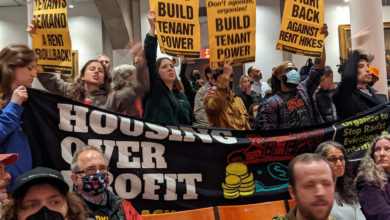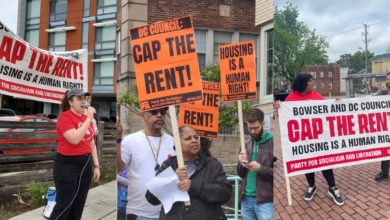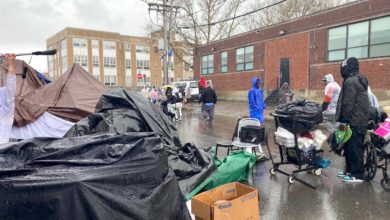
A surprise September 1 announcement by the Centers for Disease Control and Prevention has brought temporary protection to an estimated 30 to 40 million people at risk of eviction in the next several months. The widespread ban on evictions through the end of the year is flawed and does not do nearly enough, and reshapes the political dynamics just two months before the November election.
President Trump’s handling of the COVID-19 crisis has been disastrous in many ways, with bizarre claims about cures and too many lies to count. His increasingly open support for murderous rightwing extremists, often linked with local police, threatens to increase violence in an already volatile time.
Trump is no friend of the working class, but suddenly, with one sweeping decision that brings actual relief to desperate tenants, he has shifted the tone of the campaign. This has been in sharp contrast with Congress, where political posturing and a bipartisan lack of urgency in the face of crisis has been revealed for all to see. Millions of people, celebrated as “essential workers” when they kept the country running even without adequate protection in the early days of the pandemic, have seen how little they are valued by the political establishment.
The Democrats’ disconnect from working class realities was illustrated by House Speaker Nancy Pelosi’s mid-April segment on James Corden’s late night television show. In it, she showed off her freezer stocked with gourmet ice cream, emphasizing how much she loves chocolate. This was in a time when news stories featured people waiting in long lines for free food. The Trump campaign, seeing political gold, quickly made an advertisement interspersing a clip of Pelosi showing off her luxury ice cream with testimonies of people worrying about running out of food.
The Democrats’ lackluster response to the medical and economic crises have allowed Trump to claim: “I want to make it unmistakably clear that I’m protecting people from evictions.” This turn of events comes as the Biden campaign courts conservative Republicans and emphatically rejects the popular policies that energized the Bernie Sanders campaign. “No” to Medicare for all, even in a pandemic. “Yes” to continued taxpayer subsidies to fossil fuel companies while forests burn and ice sheets melt. “No” to anything that would upset billionaires, even as they grow ever wealthier.
Trump’s hard core base of support appears energized, unfazed by his often erratic behavior. This new tangible protection can only increase their fervor. Biden supporters, having no actual policy proposals to rally around, are left with little more than: “At least he isn’t Trump.” It’s not a very rousing battle cry. This enthusiasm gap between the campaigns should concern the Democratic Party’s establishment after their skillfully executed defeat of Sanders’ progressive challenge.
This of course assumes that they actually want to win in November. The victorious party will face enormous challenges, not the least of which is how to please wealthy donors while appearing to care about people struggling to make ends meet. The Democrats’ lackluster campaign so far stands in sharp contrast to their well-coordinated takedown of Sanders’ campaign. Their actions suggest that they are more concerned about the threat of a popular progressive movement.
The toll so far
As of September, more than six million people have been infected in this country, and the death toll is nearly 190,000 and rising. As businesses shut down, a record more than 40 million laid off workers have filed for unemployment benefits, most also losing their health insurance at the same time.
Both Republicans and Democrats moved quickly to give trillions of dollars to Wall Street, strengthening the stock market when businesses shut down at the start of the pandemic. Billionaires have seen their wealth increase by more than $600 billion since the pandemic began.
Working class people have received next to nothing. The CARES Act, signed into law on March 27, gave workers making less than $99,000 a one-time $1,200 stimulus check. Unemployed workers were able to file for an additional $600 per week supplemental unemployment benefit. Those $600 supplements expired at the end of July. As the deadline approached and the threat of mass evictions appeared imminent, Congress took a two-week vacation for the July 4 holiday. It’s difficult to imagine a more effective way of telling tens of millions of workers – many of them voters! – that political leaders have no concern for their wellbeing.
A flawed partial solution
The CDC eviction ban has many flaws, but it brings immediate temporary relief to tenants across the country. Significantly, the ban does not actually cancel rent, so tens of millions of people will face an enormous bill for several months of unpaid rent when it expires at the end of the year. The Party for Socialism, the La Riva 2020 campaign, and people around the country have called for a rent and mortgage cancellation to prevent this accrued back rent from detonating like a time bomb at the start of 2021. In addition, not all landlords are multimillionaires; for small landlord, not receiving monthly rent payments could affect their ability to pay the mortgage, setting in motion a ripple effect to create further crisis.

The new ban was made in response to an August 8 presidential order asking CDC and the Department of Housing and Urban Development to protect people facing eviction during the pandemic. A moratorium on evictions in federally assisted housing, which was included in the CARES Act, was due to expire July 24. HUD has simply extended that eviction ban for one additional year.
CDC cited obvious public health concerns as the reason for its much broader coverage. The possibility of a massive increase in homelessness during a pandemic would be a nightmare scenario for this already disastrous year. Similarly, the infection rates could surge if people found crowded shelter with relatives or friends.
The surprise ban has drawn guarded praise from organizations that usually have opposed the Trump administration. Diane Yentel, President and CEO of the National Low Income Housing Coalition issued a statement September 1: “As we have said for five months, the very least the federal government ought to do is assure each of us that we won’t lose our homes in the middle of a global pandemic: the administration’s action would do so and will provide relief from the growing threat of eviction for millions of anxious families.”
Yentel went on to note the significant drawbacks: “But while an eviction moratorium is an essential step, it is a half-measure that extends a financial cliff for renters to fall off of when the moratorium expires and back rent is owed. This action delays but does not prevent evictions.”
Not all renters will be protected from eviction under the new ban. It applies to renters who received a stimulus check earlier in the year, were not required to report income in 2019, or expect to earn no more than $99,000 in 2020. (Or $198,000 if filing as a couple.) They must file sworn declarations that they would either be homeless or forced to live in “close quarters in a new congregate or shared living setting” in order to qualify. They also must affirm that they have “used best efforts to obtain all available government assistance for rent or housing.”
Significantly, the moratorium also does not cover tenants whose lease has simply expired, or who are found in violation of terms of their lease unrelated to their ability to pay rent during the pandemic. The text of the CDC eviction moratorium more fully describes its terms and includes a sample of the document tenants would have to submit to landlords in order to receive protection.
Just as protests through the summer have exposed widespread and systemic police violence, so the pandemic has shown that capitalism is not designed to meet peoples’ needs. The Democrats and Republicans have no interest in protecting workers and Biden’s ludicrous support for employment-linked health insurance during a pandemic is indefensible. The Trump administration’s move to ban evictions suggests that he could see a political advantage in outflanking Democrats by offering relatively progressive action. The Democrats have themselves to blame if he outmaneuvers them in the weeks before the election.
The Democrat and Republican political bickering will never bring lasting solutions. PSL has been at the forefront of protests to cancel rent, and our campaign, on the ballot in more than a dozen states, is amplifying the demand for all to hear. Vote Socialist in 2020!






